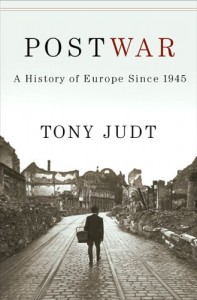The great British-born historian Tony Judt, who passed away in August, had an excellent posthumous think-piece about New York’s current status as a global city in Sunday’s Times. An excerpt:
“I arrived in New York just in time to experience the bittersweet taste of loss. In the arts the city led the world from 1945 through the 1970s. If you wanted to experience modern painting, music or dance, you came to the New York of Clement Greenberg, Leonard Bernstein and George Balanchine. Culture was more than an object of consumption: people thronged to New York to produce it too. Manhattan in those decades was the crossroads where original minds lingered — drawing others in their wake. Nothing else came close.
Jewish New York too is past its peak. Who now cares what Dissent or Commentary says to the world or each other? In 1977, Woody Allen could count on a wide audience for a joke about the two magazines merging and forming Dissentary (see Annie Hall). Today? A disproportionate amount of the energy invested in these and certain other small journals goes to the Israel question: perhaps the closest that Americans get to nombrilisme.
The intellectual gangs of New York have folded their knives and gone home to the suburbs — or else they fight it out in academic departments to the utter indifference of the rest of humanity. The same, of course, is true of the self-referential squabbles of the cultural elites of Russia or Argentina. But that is one reason neither Moscow nor Buenos Aires matters on the world stage. New York intellectuals once did, but most of them have gone the way of Viennese cafe society: they have become a parody of themselves, their institutions and controversies of predominantly local concern.
And yet, New York remains a world city.”
Tags: Clement Greenberg, George Balanchine, Leonard Bernstein, Tony Judt

